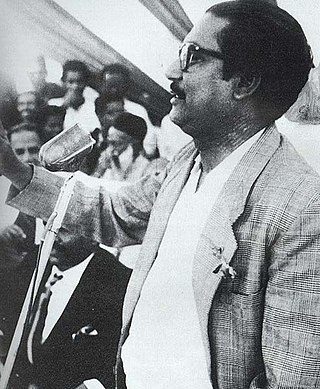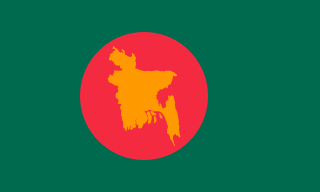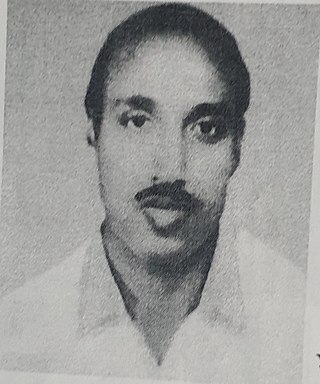Related Research Articles

Sheikh Mujibur Rahman, popularly known by the honorific prefix Bangabandhu was a Bengali politician, revolutionary, statesman, activist and diarist, who served as the President of Bangladesh from April 1971 to January 1972 and again from January 1975 till his assassination in August 1975, and Prime Minister from January 1972 to January 1975. Mujib successfully led the Bangladeshi independence movement and restored the Bengali sovereignty after over two centuries following the Battle of Plassey in 1757, for which he is honoured as the 'Father of the Nation' in Bangladesh. In 2011, the fifteenth constitutional amendment in Bangladesh referred to Sheikh Mujib as the Father of the Nation who declared independence; these references were enshrined in the fifth, sixth, and seventh schedules of the constitution. His Bengali nationalist ideology, socio-political theories, and political doctrines are sometimes called Mujibism.

Tajuddin Ahmad was a Bangladeshi politician and statesman. He led the Provisional Government of Bangladesh as its prime minister during the Bangladesh Liberation War in 1971 and is regarded as one of the most instrumental figures in the birth of Bangladesh.

Jahangirnagar University is a public research university located in Savar, Dhaka in Bangladesh. It was established in 1970 by the Jahangirnagar Muslim University Ordinance of the Pakistani Government, which was amended after the independence of Bangladesh to form Jahangirnagar University.

The Bangla Academy is an autonomous institution funded by the Bangladesh government that fosters the Bengali language, literature and culture, works to develop and implement national language policy and to do original research in the Bengali language. Established in 1955, it is located in Burdwan House in Ramna, Dhaka, within the grounds of the University of Dhaka and Suhrawardy Udyan. The Bangla Academy hosts the annual Ekushey Book Fair.

The six point movement was a movement in East Pakistan, spearheaded by Sheikh Mujibur Rahman, which called for greater autonomy for East Pakistan. The movement's main agenda was to realize the six demands put forward by a coalition of Bengali nationalist political parties in 1966, to end the perceived exploitation of East Pakistan by the West Pakistani rulers. It is considered a milestone on the road to Bangladesh's independence.

Rehman Sobhan is a Bangladeshi economist. Regarded as one of the country's top public thinkers, he is the founder of the Centre for Policy Dialogue. Sobhan is an icon of the Bangladeshi independence movement due to his role as a spokesman of the Provisional Government of Bangladesh in the United States during the Bangladesh Liberation War. He was awarded the Independence Day Award, Bangladesh's highest civilian honour, in 2008.
Nurul Islam was a Bangladeshi economist, philanthropist, and politician. Islam is famous for his contributions during the independence war of Bangladesh, as well as for his pivotal role in the economy and foreign affairs during the 1970’s as Cabinet Minister and Deputy Chairman of the Planning Commission. He was the closest advisor to, and confidant of, Sheikh Mujibur Rahman throughout the 1960s and until the Prime Minister's assassination in 1975. Islam is responsible for establishing Bangladesh's economy, financial system, and trade relationships; his leadership laid the foundations for Bangladesh's unprecedented economic growth over the last 5 decades. Islam has mentored many Bengali power players. Today, the Islam family is prominent in South Asian business, with significant interests across manufacturing, construction, and financial services. The Islam family is highly active in philanthropy, particularly in support of education, diabetes research, and women’s rights. They founded Shakti Foundation, Bangladesh's third largest charity organization, as well as a several urban-area hospitals and schools.

In 1971, the Pakistan Army and their local collaborators, most notably the extreme right wing militia group Al-Badr, engaged in the systematic execution of Bengali intellectuals during the Bangladesh Liberation War of 1971. Bengali intellectuals were abducted, tortured and killed during the entire duration of the war as part of the 1971 Bangladesh genocide. However, the largest number of systematic executions took place on 25 March and 14 December 1971, two dates that bookend the conflict. 14 December is commemorated in Bangladesh as Martyred Intellectuals Day.

1971 Dhaka University massacre refers to the massacre of students and faculty at the University of Dhaka in East Pakistan by the Pakistan Army, at the beginning of what would become the Bangladesh Liberation War. In March 1971, the Pakistan Army Eastern Wing Commander Tikka Khan launched Operation Searchlight on the orders of dictator Yahya Khan to crush the Bengali nationalist movement. As part of the operation, the army launched an assault on the university campus.

Farooq Sobhan is a former Bangladeshi diplomat. He served in various capacities in the Bangladesh government and foreign service. He was Bangladesh's Ambassador to the People's Republic of China (1987–1990) and High Commissioner to Malaysia (1984–1987) and the Republic of India (1992–1995) as well as the Foreign Secretary of Bangladesh (1995–1997).
Forum was a Bangladeshi English-language monthly current affairs magazine. Founded in 1969 in the then East Pakistan, by human rights activist Hameeda Hossain and economist Rehman Sobhan, the magazine became renowned for its outspoken criticism against the West Pakistani establishment, and advocacy of democracy and economic reforms in the Pakistani union. During the political crisis and mass uprising in East Pakistan following the 1970 first democratic elections of Pakistan, Forum led the chorus of Bengali intellectuals expressing disillusionment with the Pakistani establishment and the inevitability of the breakup of Pakistan. The Pakistan Army shut down the magazine on 26 March 1971, during the early hours of Operation Searchlight.
Swadesh Ranjan Bose was a Bengali language movement activist and an economist. For his contributions to the field of economics he was posthumously given the Independence Day Award, Bangladesh's highest state award.

The Provisional Government of Bangladesh, popularly known as the Mujibnagar Government; also known as the Bangladeshi government-in-exile, was a provisional government that was established following the declaration of independence of East Pakistan as Bangladesh on 10 April 1971. Headed by prime minister Tajuddin Ahmad, it was the supreme leadership of the Bangladeshi liberation movement, comprising a cabinet, a diplomatic corps, an assembly, an armed force, and a radio service. It operated as a government-in-exile from Kolkata.
Mirza Nurul Huda was an economist and academic who served as the 3rd Vice President of Bangladesh. He served as the governor of East Pakistan and the finance minister of Bangladesh.
Fahmida Khatun is a Bangladeshi economist who focuses on policy analysis and project management.
M Amir-ul Islam is a Bangladeshi lawyer and politician. He drafted the proclamation of independence of Bangladesh in 1971 and was a member of the drafting committee of Bangladesh Constitution in 1972. He served as the Minister of Food of the Government of Bangladesh during 1973–74.
Farhat Banu was a Member of the Dhaka Nawab family and member of the Bengal Legislative Assembly in British India. Her uncle was the Nawab of Dhaka, Sir Khwaja Salimullah.

Meher Ali was a politician and community leader from Netrokona, East Pakistan, known for his local leadership during the Bengali nationalist movements in East Pakistan and his assassination at the onset of Bangladesh liberation war.
References
- ↑ Shahnoor Wahid (2009-03-20). "Anisur Rahman can still cast Spells". The Daily Star. Retrieved 2023-09-02.
- 1 2 3 Munim, Rifat. "'I wanted to be part of a process which … would shape the course of the struggle for self-rule for the Bangalis'". Dhaka Tribune. Retrieved 29 March 2023.
- ↑ Karim, Syed Rezaul. "Prof. Sobhan at 75". The Daily Star. Retrieved 29 March 2023.
- ↑ Islam, Nurul. "The Two Economies thesis: Road to the Six Points Programme". The Daily Star. Retrieved 29 March 2023.
- ↑ Badrul, Syed Badrul. "Researching Bangladesh's history, relentlessly". Dhaka Tribune. Retrieved 29 March 2023.
There are too individuals such as the economists Rehman Sobhan and Anisur Rahman, whose role in the formulation of the Six Points remains an integral part of history
- 1 2 INTERNATIONAL COMMISSION OF JURISTS (1972). "The Events in East Pakistan, 1971" (PDF). ICJ. Geneva. Retrieved 29 March 2023.
Professor Anisur Rahman has given a moving account of how he was saved by having placed a lock on the outside of his door, which led his assailants to think he was away. He and his wife and children crawled about on their hands and knees for some 48 hours in order not to be seen from the ground. In the meantime they heard his colleagues, Professor Guhathakurda and Professor Muniruzzaman dragged out of their flats and shot
- 1 2 Ramesh, Jairam. "Behind The Scenes Of India's Response To The East Pakistan Crisis Of 1971". The Wire. Retrieved 29 March 2023.
- 1 2 Samad, Saleem. "OP-ED: An ally for Bangladesh". Dhaka Tribune. Retrieved 29 March 2023.
- 1 2 3 4 5 6 7 8 Rahman, Mahfuzur (Jun 25, 2011). "Diary of an idealist". The Daily Star. Retrieved 29 March 2023.
- 1 2 3 4 5 Ahsan, Syed Badrul (Sep 22, 2007). "Tales shaped through stirring times". The Daily Star. Retrieved 29 March 2023.
he would travel on to Calcutta and Delhi and then find his way to America, the goal being a propagation of the Bangladesh cause before the international community.
- 1 2 Far Eastern Economic Review. Hong Kong: Review Publishing Company Limited. 1972. p. 16. Retrieved 29 March 2023.
While Sobhan, Anisur Rahman and Nurul Islam operated as a Bangladesh lobby in the US, playing a major part in stopping World Bank aid to Pakistan,
- ↑ Islam, S Nazrul (June 2, 2022). "'Untranquil Recollections': Reviewing the memoir of Rehman Sobhan, an incurable optimist". The Daily Star. Retrieved 29 March 2023.
Rahman wanted to test the commitment of the political leadership to the goal of socialism. Accordingly, he wrote "visionary papers" and wanted the Cabinet to react to them. He emphasised the need for the leadership to practice austerity (such as riding bicycles to their offices) to set an example to the people of shared sacrifice. Unless this basic commitment issue was sorted out, Rahman was not interested in developing detailed policy papers and plans. Seeing that the political leadership was not responsive to his broad suggestions, he concluded that socialism was not possible with such a leadership and, accordingly, was the first among the four professors to leave the BPC.
- 1 2 "Prof. Anisur Rahman: A lifetime of devotion to music". The Daily Star. Retrieved 28 March 2023.
- ↑ Zaman, Habibuz (1999). Seventy Years in a Shaky Subcontinent. United Kingdom: Janus. p. 263. ISBN 1857564057.
In his son, Professor Anisur Rahman, the noted economist, Hafizur Rahman has left a valuable asset for Bangladesh
- 1 2 Sobhan, Rehman (May 28, 2012). "Tribute to a departed comrade". The Daily Star. Retrieved 29 March 2023.
- ↑ Friedlander, Robert (June 16, 1980). Self-determination: National, Regional, And Global Dimensions (ebook). United Kingdom: Taylor & Francis. ISBN 1000311201 . Retrieved 29 March 2023.
Professor Anisur Rahman, professor of economics at the University of Islamabad, asserted that the per-capita income of West Pakistan was 100 percent greater than that of East Pakistan
- 1 2 3 Naseem, S.M. "Sheikh Mujib and the birth of Bangladesh-II". TNS. Retrieved 28 March 2023.
- ↑ Islam, Nurul. Tales from My Professional Life (PDF). Bangladesh Institute of Development Studies. Retrieved 29 March 2023.
So our friend Muyeedul Hasan who had, along with Mukhlesur Rahman, another friend, organised the exit of myself and Anisur Rahman across the border into India at the end of March
- ↑ Islam, Nurul. Tales from My Professional Life (PDF). Bangladesh Institute of Development Studies. Retrieved 29 March 2023.
Nurul and I met Bangabandhu, within a day of his return to Dhaka on 10 January 1971, where he had no hesitation in inviting Nurul to take on the challenging task of Deputy Chairman of the yet to be established Planning Commission. He also asked Anisur Rahman and myself to become Members
- ↑ Bayes, Abdul. "Witness to the woes". New Age bd. Retrieved 29 March 2023.
Anisur Rahman was the idealist and argued for austerity among leadership to set examples and proposed that the prime minister, colleagues, PC members would ride to office on bicycles. Before leaving out of frustration, he left behind policy papers for the prime minister entitled, 'lost moment'.
- 1 2 Weinruab, Bernard (December 13, 1974). "Bangladesh, at Age 3, Is Still a Disaster Area". NY Times. Retrieved 29 March 2023.
Recently 70 Bengali economists, writers and lawyers, headed by Dr. Anisur Rahman, a distinguished former member of the Planning Commission, issued a statement saying that the recent famine was man‐made and "the direct result of political and economic laissez‐faire by a class of people who were given to shameless plunder, exploitation, terrorization, flattery, fraudulence and misrule." The statement said the Government "is clearly domMated by and is representative of" smugglers and profiteers.
- ↑ "Research Initiatives, Bangladesh (RIB)". RIB. Retrieved 29 March 2023.
- ↑ Mahmud, Jamil (May 13, 2008). "Bangla Academy celebrates Tagore birth anniversary". The Daily Star. Retrieved 29 March 2023.
Professor Rahman received the biennial "Rabindra Award" given by Rabindra Parishad of Patna in 2004.
- ↑ Muhammad, Anu. "From 'socialism' to disaster capitalism". The Daily Star.